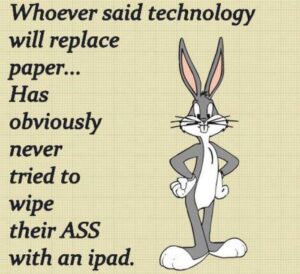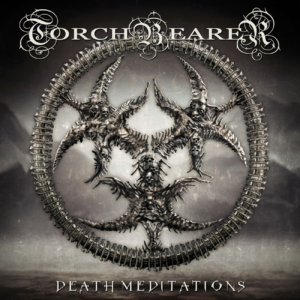Philip Gordon

Image: creator unknown.
What People Thought Would Happen
Since the inception of the internet and the mass adoption of its wondrous potential, people have been predicting all kinds of changes to the world of printed books. Imagine yourself as a child many years from now sitting on your grandfather’s lap. He clears his throat after a long raspy sip from his scotch on the rocks and tells you a story. “ When I was your age Timmy, people read books.” “Ah Grampa? What’s a book?” You’d ask nervously. “Well, books were a technological innovation where stories and information were printed on pages and bound together.” Your grandfather puts his hands together to demonstrate either side of the book, folding them open then apart to show the motion used when opening and shutting a book. You look wide eyed at him in confused amazement. “Hold on Grampa, let me look up what a book is online.” You close your eyes and see the web in your mind’s eye and search for an image of a book using only your thoughts immediately understanding all of its functions. “Why do you tell me about all this useless stuff Grampa, people don’t need to read anymore… we just know everything.” Your grandfather, gets up out of his chair looks out the window and sheds one single tear. The tear slides down his wrinkled face while his image reflects in the darkness of the window pane.

Image: makeameme.org.
Good Tidings of Great Joy The Book Has Not Died … Yet?
If this is the future you imagine when you think about the what will happen to books. If you feel the internet has killed books then dispel your fear. The book is likely to be fine for the time being. It just has a bit of competition now. In 1992 Robert Coover argued that the invention of hypertext would push out print text as a medium and possibly change the landscape of print text forever. But one thing he noted captures why print books still maintain their market share. “Writing students are notoriously conservative creatures. They write stubbornly and hopefully within the tradition of what they have read. Getting them to try out alternative or innovative forms is harder than talking them into chastity as a lifestyle” (Coover). The same can be said about the people who really love books. They want to feel the pages between their fingers. In the same way writers are slow to adapt to change, so are their readership, in 2018 print sales were up 2.5 percent (Milliot). Although print sales have improved in recent years digital sales rose over 1000% between 2008 and 2010 (Nuwer). The sales of print have since improved however and digital sales seem to have settled down. There is of course a great deal of speculation as to what will come of the printed book but for now everyone can relax in the knowledge that even if the future market share shrinks those who still want a paper copy will be able to find one.
I find it unlikely that printed books will be killed by the internet. Especially when huge conglomerates like amazon founded the future success of their website on book sales. Even if a portion of the market share goes digital there will still be huge companies that will supply printed books. Just like innovation in the past, new technology most certainly displaces other forms but does not necessarily remove them entirely. Displacement is different than removal because it means the market share is split between various mediums rather than being replaced entirely. “In hindsight, we can see how rarely one technology supersedes another. Television didn’t kill radio any more than radio ended reading” (Price).
Future of the Book – Conclusion
The Internet has most certainly changed many things about how we read and the amount of variety in the content we consume. However, the likelihood of the internet killing the printed book completely is pretty small for the time being. Perhaps in five years it would be prudent to revisit this topic and see if things have shifted but for now relax kick back and pull out a good book.
If you still feel like the crying grampa after reading this post you can check out this death metal song by Torchbearer called “Dying Codex”. It really inspired me while I was writing my post. XD. https://www.youtube.com/watch?v=Nbm9M9DrO0I
Works Referenced & Cited
Coover, Robert. “The End of Books.” The New York Times, The New York Times, 21 June 1992, archive.nytimes.com/www.nytimes.com/books/98/09/27/specials/coover-end.html.
Milliot, Jim. “Print Unit Sales Up in 2018 to Date” publishers weekly, 5 October 2018, https://www.publishersweekly.com/pw/by-topic/industry-news/bookselling/article/78257-print-unit-sales-up-in-2018-to-date.html
Nuwer, Rachel. “Are Paper Books Really Disappearing?”. BBC, 25 January 2016, http://www.bbc.com/future/story/20160124-are-paper-books-really-disappearing
Price, Leah. “Dead Again”. The New York Times, The New York Times, 10 August 2012, https://www.nytimes.com/2012/08/12/books/review/the-death-of-the-book-through-the-ages.html
Ryan, Johnny. A History of the Internet and the Digital Future. Reaktion Books, 2010.
Wood, Zoe. “Paperback Fighter: Sales of Physical Books now Outperform Digital Titles”. The Guardian. 17 March 2017. https://www.theguardian.com/books/2017/mar/17/paperback-books-sales-outperform-digital-titles-amazon-ebooks
HammerovtheDestroyer. Torchbearer. “Dying Codex” https://www.youtube.com/watch?v=Ot8Hi_0bwo4


